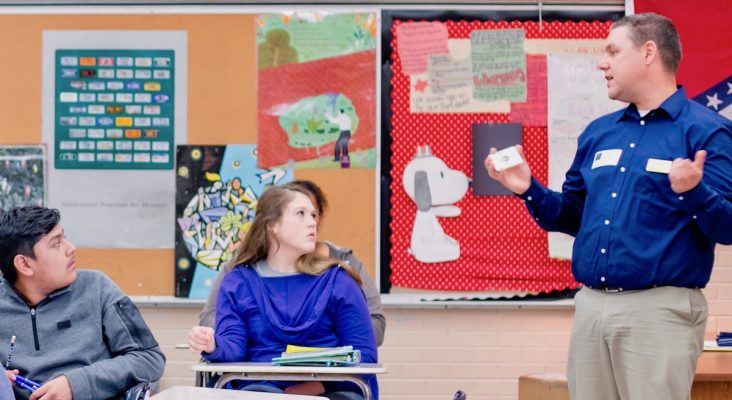UAFS professors develop ‘game’ to better understand economics
by March 9, 2020 6:21 pm 1,158 views

Dr. Dan Settlage, with the University of Arkansas at Fort Smith College of Business, introduces Kimmons Junior High students to economics game. (photo courtesy of UAFS)
Economics is not an easy subject for most people to understand. The concepts of market formation, industrial organization and behavioral implications of market structure are difficult for the average adult to grasp. For a student, understanding it all can feel impossible.
Two University of Arkansas at Fort Smith professors have found a way to reach students by presenting entrepreneurship, markets and equilibrium price formation and firm profit in a way they can understand, learn and use. Dr. Dan Settlage and Dr. Jim Wollscheid, professors in the UAFS college of business, developed a flexible economic game that can be implemented in classrooms to help students and teachers in secondary school and at the university level.
The two were rewarded for their work when their paper, “The Invisible Hand in Action – An Interactive Classroom Experiment,” received the 2019 Best Paper Award from Journal of Economics Teaching at the JET 2020 Symposium for Economics Teaching Jan. 24-25 in New Orleans. The paper describes the entrepreneurship game that can be used to teach entrepreneurship, markets and equilibrium price formation and firm profit.
“In this paper, we establish an interactive entrepreneurship game that can be played in a single class period. … In a single class period, students form markets and observe “the invisible hand,” form collusive cartels, and see competitive profit driven to zero. In addition, the game can be easily extended to bring new economic topics into the existing framework over the entire course,” a synopsis of the paper noted.
Because economics has typically been taught by “chalk and talk” delivery, students frequently have an abstract view of the subject. Settlage and Wooscheid set out to find a way to get students excited about the subject. The game served that purpose.
“This game is easy to set up, requires minimal resources, and is adaptable to a variety of economic topics. The game would be best suited for an economics or other business related courses in high school or at the principles level in universities. The baseline game does not require any previous economic knowledge from the participants and could be utilized as early as the first week of class as a way for students to interact with their classmates and develop a ‘feel’ for economics in general and the way in which markets function,” the team wrote in the paper.
Over the past two years, the game has been demonstrated in a high school setting through UAFS’s Adopt-A-Professor partnership, which began in 2015. The program pairs volunteer teachers in pre-kindergarten through 12th grade levels in the area with volunteer UAFS professors. Each teacher/professor pair develops three unique, creative, hands-on learning engagements over the course of an academic semester. The engagements may take place at the school, on campus, or in the greater community with industry partners.
The program accomplishes a number of things, said Jenn Jennings, executive director for the Office of P-20 Collaboration, which oversees the Adopt-a-professor program. It gives students a chance to visualize themselves going to college through visits to UAFS and it allows them to meet a professor, see them as a real person and make a connection.
“Someone like Dr. (Dave) Mayo (a geology professor at UAFS) goes to the school and gets these students digging dirt on the playground and analyzing it. They see the soil samples; they take notes. But they also see this is a real person who wants to see them learn, who wants them to succeed, who tells them, ‘you’re smart.’ That is really a way for them to make a connection,” Jennings said.
Because there are three interactions during the semester, the program makes more of an impression on the students and also allows professors to connect with students and build a relationship with them and with their teachers. It introduces area teachers to resources available to them at UAFS, Jennings said.
“We’re showing them they have assets here they can use,” she said.
The program is funded through the UAFS educational renewal zone, which is funded through the Arkansas Division of Elementary and Secondary Education. It averages 12 to 15 teams of UAFS faculty or staff and area teachers per semester.
Settlage and Wollscheid have participated in seven semesters of the program, pairing with teachers at Ramsey Junior High School, Kimmons Junior High School and Alma High School.
“Having an economically literate society is crucial for our democracy,” Jennings said. “Students are empowered when they understand how economics impact them—from understanding supply and demand and how prices are determined to being able to discern implication of varying market structures. Doctors Settlage and Wollscheid, alongside the teachers and students who have ‘adopted’ them over the years, are accomplishing just that; they are empowering students through economic literacy. They make the learning real.”
Settlage and Wollscheid said they appreciate the award they received, but more importantly they appreciate the commitment of the university to teaching and scholarship.
“It is an honor to receive an award acknowledging the efforts that are put into the classroom experience to improve the student’s experience with economics,” Wollscheid said.
